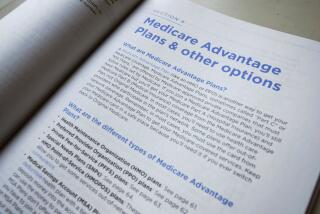There Is Merit in Adding Prescription Benefits to Medicare
- Share via
The Bipartisan Commission on the Future of Medicare, which had been due to report its recommendations March 1, is at an impasse--and not, as some of us might hope, because of objections to a proposal to convert Medicare into a voucher program. No, the snag is that the commission needs 11 votes out of 17 to submit a recommendation to Congress and the president, and two swing members have said that the price of their support for the voucher proposal is the addition to Medicare of a prescription drug benefit.
Those members are right and wrong. The expansion of drug coverage makes sense, if Congress provides the money. The conversion of Medicare from a social insurance program to a voucher scheme doesn’t make sense, with or without a drug benefit.
In 1965 when Medicare was enacted, few private insurers covered the costs of prescription drugs. Medicare, modeled after private insurance, didn’t either, and that was no surprise. After all, the program wasn’t originally designed to cover all of the medical costs of the elderly, only the most financially devastating. Medicare began as an incremental program, with its advocates hoping that its scope--in terms of benefits and beneficiaries--would be expanded at a later date.
Over the past three decades, however, prescription drug coverage has become an increasingly common benefit in private health insurance policies. Medicare has not kept pace. Congress, concerned about the level and growth of Medicare costs, has been reluctant to add drug benefits. In response to Medicare’s coverage limitations--and not only concerning payment for prescription drugs--a private market of supplemental insurance policies for the elderly developed. According to the Health Care Financing Administration, 65% of the elderly now have some form of outpatient drug coverage through these supplemental insurance plans or, in smaller numbers, from Medicare HMOs that include such coverage or from Medicaid.
But to say that about two-thirds of seniors have managed to secure some degree of drug coverage is not to say that all is well. First, of course, one-third are without any drug coverage at all. When they need prescription medications--and about 80% of the elderly use prescription medications regularly--they must bear the full cost. Many delay or forgo medications for financial reasons and suffer physically as a result. Those who do buy needed medications may suffer financially. According to a new report from the Commonwealth Fund, 11% of the elderly--and 18% of those who are in fair or poor health--pay more than $100 a month for prescription drugs. (This is a population, we should remember, of modest means; the median income among the elderly is not much above $15,000 per year.) And 1% of the elderly who use prescription medications, a Rand analysis found, spend more than 25% of their household incomes on those medications.
Second, the coverage that the lucky 65% has is often sharply limited--by high deductibles, co-payment requirements and annual caps on reimbursement. A recent survey of Medicare beneficiaries by the Health Care Financing Administration found that those who had drug coverage through supplemental insurance they had purchased themselves ended up paying 54% of the costs of their prescription medications--on top of the costs of the policies. (Those whose drug coverage came through employer-sponsored supplemental insurance fared better, paying about 31% of drug costs.) As drug prices continue to escalate and as employers continue to drop or reduce supplementary health insurance for retirees, seniors will face sharper tradeoffs between their physical and financial health unless outpatient prescription drug coverage is added to Medicare.
Some members of the bipartisan commission claim that a new drug benefit could be paid for out of the savings from turning Medicare into a voucher program in which seniors would be allocated a sum toward the purchase of their insurance. That’s wishful thinking if it assumes that the combination of financial incentives and intensified competition among managed care plans will cut costs. Last year, premiums in the Federal Employees Health Benefits Program, which the voucher proposal is modeled on, increased by an average of 8.5%; this year, they are projected to jump 10.2%. (By comparison, per capita costs in the Medicare program increased less than 1% last year and may even decline this year.)
How, then, could a voucherized Medicare program save enough money to fund a prescription drug benefit? By shifting costs of coverage, over and above the government’s fixed contributions, to seniors themselves.
Let’s not kid ourselves. A drug benefit for Medicare beneficiaries, financed by capping the government’s financial commitments and offloading costs onto seniors, would be no bargain for seniors. What makes more sense, as a matter of policy and equity, is to separate the prospect of a prescription drug benefit from a voucher plan and fund the benefit honestly through the regular Medicare benefit process.
More to Read
Inside the business of entertainment
The Wide Shot brings you news, analysis and insights on everything from streaming wars to production — and what it all means for the future.
You may occasionally receive promotional content from the Los Angeles Times.










